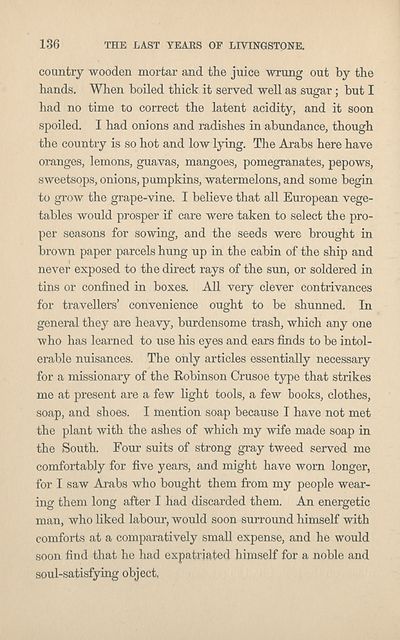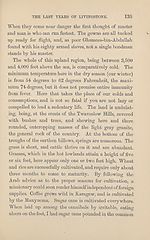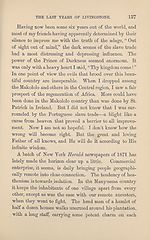Download files
Complete book:
Individual page:
Thumbnail gallery: Grid view | List view

136
THE LAST YEARS OF LIVINGSTONE.
country wooden mortar and the juice wrung out by the
hands. When boiled thick it served well as sugar; but I
had no time to correct the latent acidity, and it soon
spoiled. I had onions and radishes in abundance, though
the country is so hot and low lying. The Arabs here have
oranges, lemons, guavas, mangoes, pomegranates, pepows,
sweetsops, onions, pumpkins, watermelons, and some begin
to grow the grape-vine. I believe that all European vege¬
tables would prosper if care were taken to select the pro¬
per seasons for sowing, and the seeds were brought in
brown paper parcels hung up in the cabin of the ship and
never exposed to the direct rays of the sun, or soldered in
tins or confined in boxes. All very clever contrivances
for travellers’ convenience ought to be shunned. In
general they are heavy, burdensome trash, which any one
who has learned to use his eyes and ears finds to be intol¬
erable nuisances. The only articles essentially necessary
for a missionary of the Robinson Crusoe type that strikes
me at present are a few light tools, a few books, clothes,
soap, and shoes. I mention soap because I have not met
the plant with the ashes of which my wife made soap in
the South. Four suits of strong gray tweed served me
comfortably for five years, and might have worn longer,
for I saw Arabs who bought them from my people wear¬
ing them long after I had discarded them. An energetic
man, who liked labour, would soon surround himself with
comforts at a comparatively small expense, and he would
soon find that he had expatriated himself for a noble and
soul-satisfying object,
THE LAST YEARS OF LIVINGSTONE.
country wooden mortar and the juice wrung out by the
hands. When boiled thick it served well as sugar; but I
had no time to correct the latent acidity, and it soon
spoiled. I had onions and radishes in abundance, though
the country is so hot and low lying. The Arabs here have
oranges, lemons, guavas, mangoes, pomegranates, pepows,
sweetsops, onions, pumpkins, watermelons, and some begin
to grow the grape-vine. I believe that all European vege¬
tables would prosper if care were taken to select the pro¬
per seasons for sowing, and the seeds were brought in
brown paper parcels hung up in the cabin of the ship and
never exposed to the direct rays of the sun, or soldered in
tins or confined in boxes. All very clever contrivances
for travellers’ convenience ought to be shunned. In
general they are heavy, burdensome trash, which any one
who has learned to use his eyes and ears finds to be intol¬
erable nuisances. The only articles essentially necessary
for a missionary of the Robinson Crusoe type that strikes
me at present are a few light tools, a few books, clothes,
soap, and shoes. I mention soap because I have not met
the plant with the ashes of which my wife made soap in
the South. Four suits of strong gray tweed served me
comfortably for five years, and might have worn longer,
for I saw Arabs who bought them from my people wear¬
ing them long after I had discarded them. An energetic
man, who liked labour, would soon surround himself with
comforts at a comparatively small expense, and he would
soon find that he had expatriated himself for a noble and
soul-satisfying object,
Set display mode to:
![]() Universal Viewer |
Universal Viewer | ![]() Mirador |
Large image | Transcription
Mirador |
Large image | Transcription
| Antiquarian books of Scotland > Scotland/Scots > Last years of Livingstone > (144) |
|---|
| Permanent URL | https://digital.nls.uk/136058890 |
|---|
| Description | Thousands of printed books from the Antiquarian Books of Scotland collection which dates from 1641 to the 1980s. The collection consists of 14,800 books which were published in Scotland or have a Scottish connection, e.g. through the author, printer or owner. Subjects covered include sport, education, diseases, adventure, occupations, Jacobites, politics and religion. Among the 29 languages represented are English, Gaelic, Italian, French, Russian and Swedish. |
|---|

